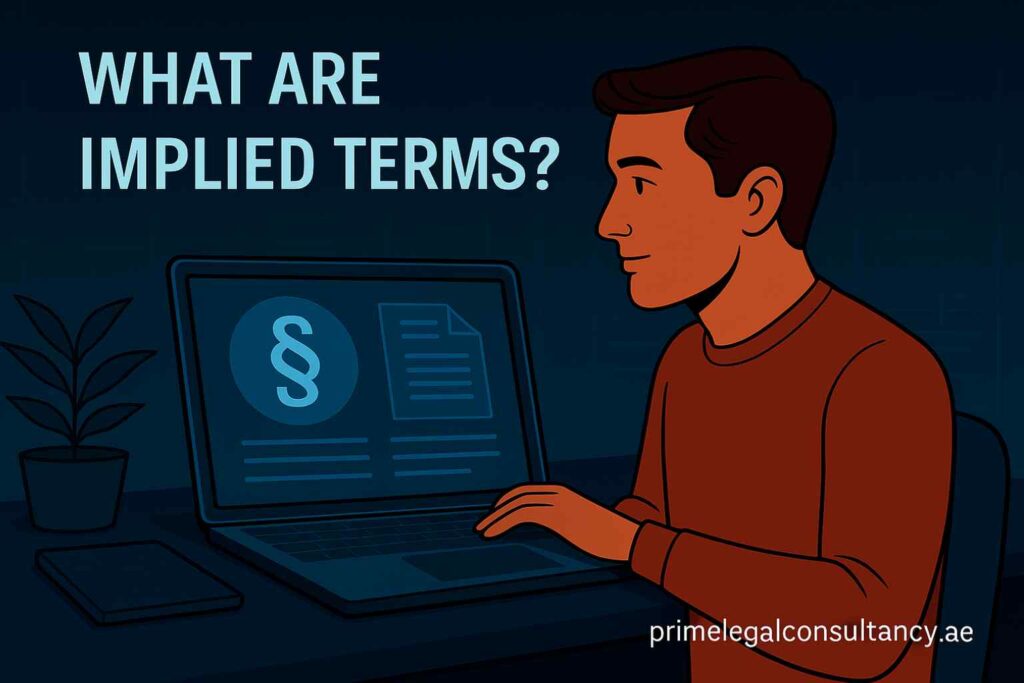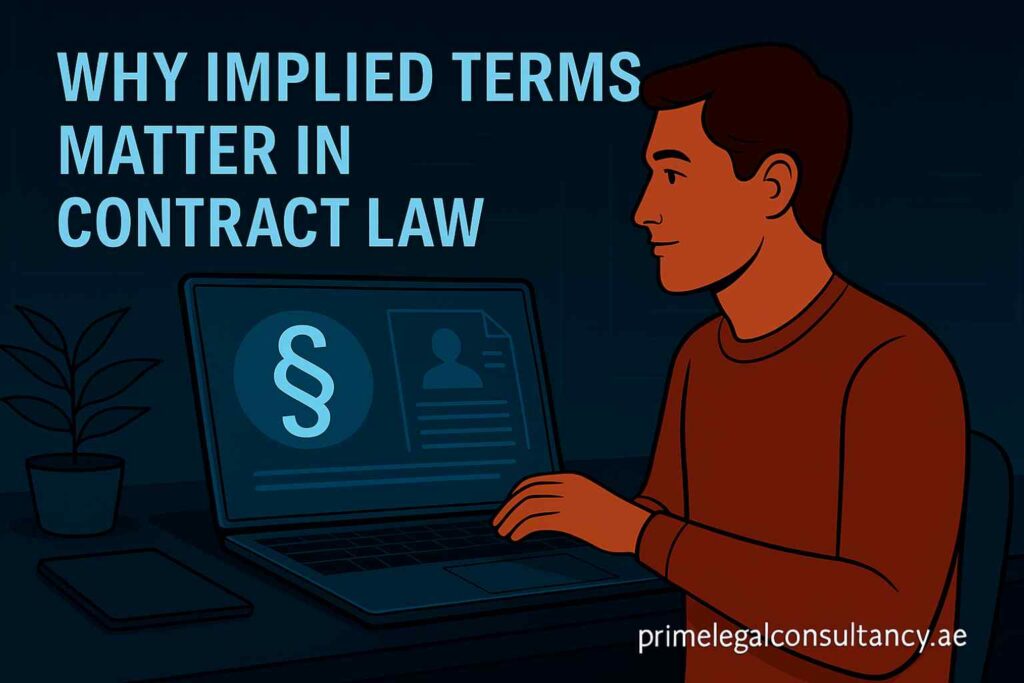Introduction
Contracts form the backbone of most business and personal transactions, but not every agreement is spelled out in detail. Many essential elements are assumed or expected, even if not directly stated. These are known as implied terms, and they hold significant legal weight in contract law. Whether you’re a business owner, lawyer, or just someone trying to make sense of legal obligations, knowing what implied terms are can protect your rights and help avoid disputes.
Implied terms are not written in the contract but are still legally enforceable. They fill in the gaps to ensure fairness, efficiency, and the smooth functioning of contractual relationships. Courts and legal systems rely on a mix of legal standards, customs, and the intent of parties to determine what these terms should be.

Table of Contents
ToggleWhat Are Implied Terms?
Implied terms are provisions that are not explicitly written in a contract but are assumed to be part of it because of the nature of the agreement, the conduct of the parties, or the legal context. These terms help interpret the contract in a fair and logical manner, ensuring both parties fulfill their expected responsibilities.
There are two main categories: terms implied by law and terms implied by fact. The first type is automatically included in specific kinds of contracts due to legal statutes or precedents. The second type arises from the specific circumstances of the agreement, where both parties might reasonably assume certain obligations exist.
Types of Implied Terms in Contracts
Understanding the two major types of implied terms is key to grasping their legal importance. Here’s a breakdown:
- Implied by Law: These are terms that the law inserts into certain kinds of contracts, such as employment or sales contracts. They are based on legal rules and principles that apply generally, regardless of what the parties agreed upon.
- Implied by Fact: These arise from the actual intentions of the contracting parties. They are based on the presumed understanding that if the issue had been discussed, both parties would have agreed to include the term.
Examples of Common Implied Terms
Some frequently recognized implied terms include:
- The duty to act in good faith — this ensures that both parties deal fairly and honestly with each other.
- The requirement for services to be carried out with reasonable care and skill — particularly important in service contracts.
Other common examples include the employer’s obligation to provide a safe work environment or a tenant’s duty not to damage rented property. These terms are often assumed to be so obvious that there’s no need to write them down.

Why Implied Terms Matter in Contract Law
These terms ensure that a contract functions as expected, even when parties fail to outline every detail. They reduce the risk of loopholes, misunderstandings, or unjust enrichment.
For example, in employment law, if a contract does not specify break times, it’s usually assumed that reasonable rest breaks will be provided. Courts use implied terms to maintain balance and fairness, particularly when one party has more bargaining power than the other.
Legal Tests Used to Identify Implied Terms
Courts use several legal standards to determine whether a term should be implied in a contract. These include:
- The Business Efficacy Test: A term is implied if it’s necessary for the contract to make sense or work effectively.
- The Officious Bystander Test: A term is implied if both parties would have agreed to it as obvious had someone suggested it during the contract formation.
These tests help courts avoid reading too much into a contract but still allow them to fill in obvious gaps that were unintentionally left open.
Types and Features of Implied Terms
| Type | Source | Purpose | Example |
|---|---|---|---|
| Implied by Law | Statutes or Common Law | Ensure fairness and compliance | Duty to pay a reasonable wage in employment contracts |
| Implied by Fact | Inferred from conduct/intent | Reflect parties’ true intentions | Implied term to deliver goods in reasonable time |
Limitations and Restrictions of Implied Terms
While useful, courts are cautious in applying implied terms. They avoid rewriting or significantly altering the contract. A court cannot insert an implied term simply because it seems fair — there must be strong justification based on conduct, necessity, or legal precedent.
Additionally, express terms always take precedence. If a written term contradicts an implied one, the written term usually stands. Courts also refrain from implying terms that would create significant new obligations not originally contemplated.

How Courts Apply Implied Terms in Real Cases
Judges carefully evaluate the circumstances surrounding the contract, including the industry norms, prior dealings between parties, and general expectations. This helps them decide whether a term was implicitly agreed upon, even if it wasn’t documented.
For instance, in commercial contracts, if a seller has always delivered on Fridays and suddenly changes the schedule, the buyer may claim breach based on an implied term of consistent delivery timing. The court will assess what was normal and expected in such situations.
Importance for Individuals and Businesses
Understanding implied terms allows you to better assess your risks and responsibilities in any contract. Businesses can avoid costly disputes by considering what might be expected or assumed under the law, even if not written in black and white.
Similarly, individuals entering rental agreements, employment contracts, or even simple service agreements benefit from knowing their implied rights and duties. This awareness empowers smarter decisions and clearer expectations.
Also Read: Corporate Compliance Law Rules & Tips 2025
Conclusion
Contracts may not always say everything, but what they leave unsaid can still carry legal power. Implied terms play a crucial role in making sure agreements function smoothly and fairly. By understanding their types, origins, and how courts interpret them, both individuals and businesses can protect their interests and uphold their responsibilities. Legal certainty doesn’t always require words — sometimes, it only needs understanding.
FAQ About What is Implied Terms in Contract Law
Q1: Why are implied terms important in a contract?
Ans: Implied terms fill in gaps in a contract to ensure fairness, functionality, and legal effectiveness based on context or legal principles.
Q2: When can terms be implied?
Ans: Terms are implied when they are necessary for business efficacy or arise from established customs, statutes, or court interpretations.
Q3: What implied terms do all contracts include?
Ans: Common implied terms include duties of good faith, reasonable care, and fitness for purpose, depending on the contract type and jurisdiction.
Q4: What are implied terms in a contract case?
Ans: In legal cases, implied terms are those not expressly written but enforced by courts to reflect the parties’ presumed intentions or fairness.
Q5: What are implied terms in a contract?
Ans: Implied terms are unwritten provisions that are assumed to exist in a contract due to law, custom, or necessity for its proper operation.
Q6: What is an example of an implied in law contract?
Ans: An implied-in-law contract arises when the court enforces obligations like payment for emergency services, even without a formal agreement.
Q7: What are implied terms in fact in a contract?
Ans: Implied-in-fact terms are those both parties clearly assumed but did not state explicitly, often inferred from conduct or prior dealings.
Q8: What is an implied condition in a contract?
Ans: An implied condition is a necessary, unwritten clause that must be fulfilled for the contract to be valid, like using a product safely.
